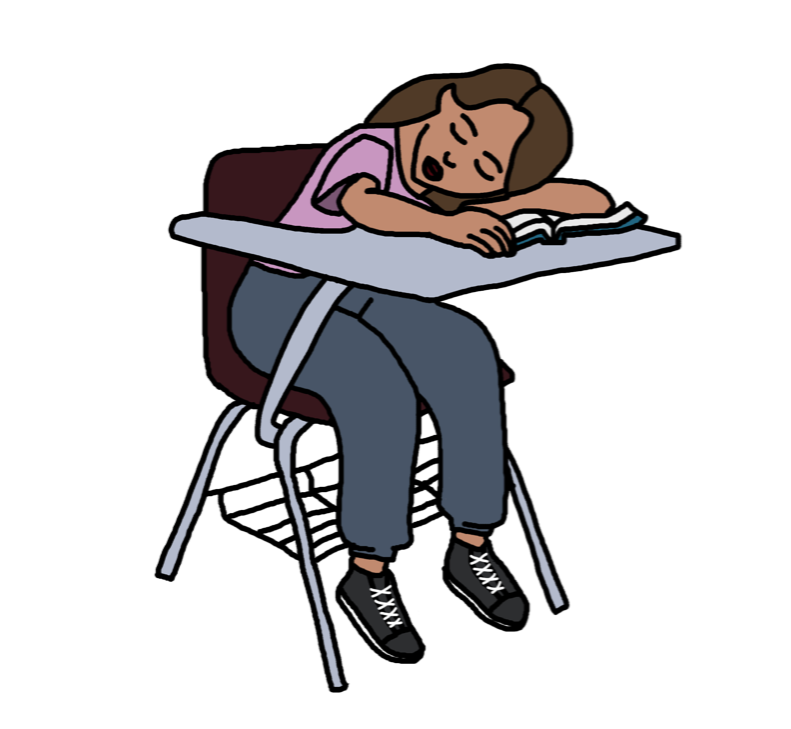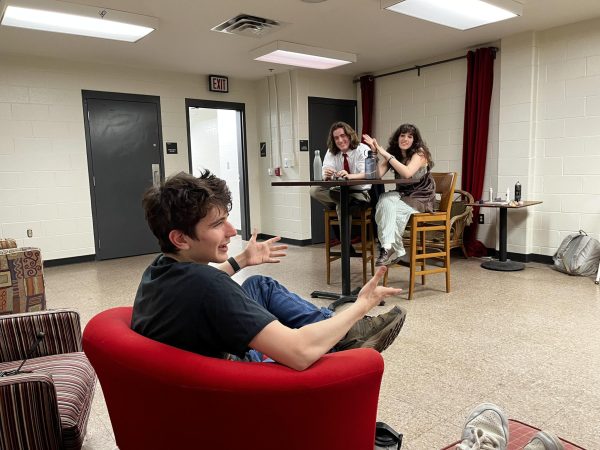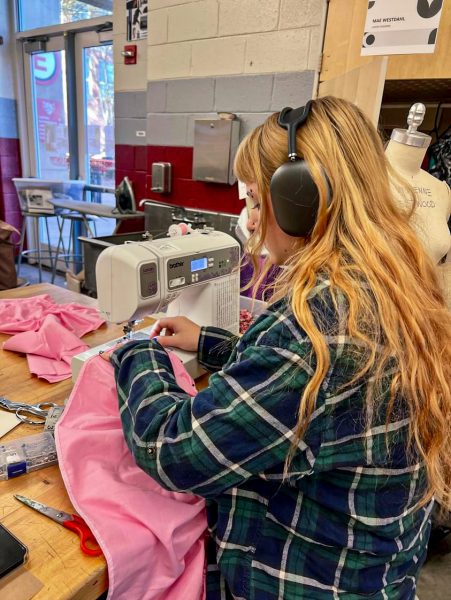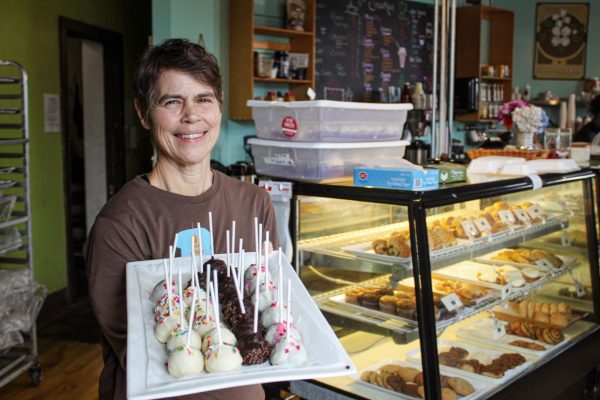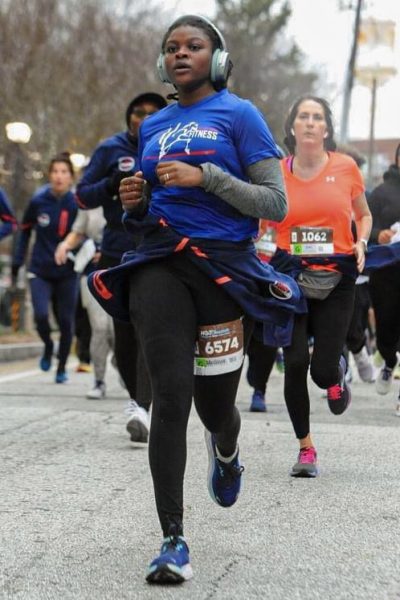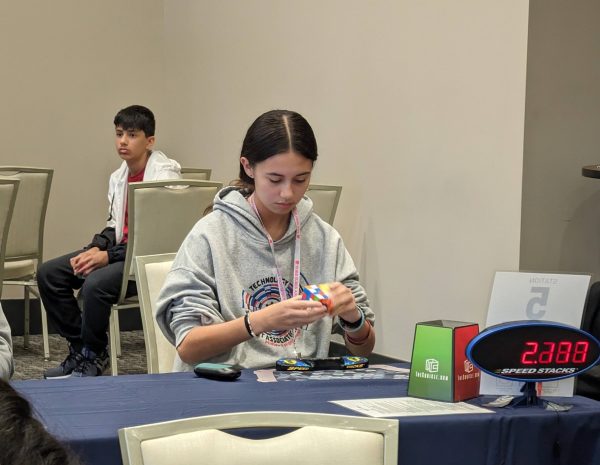Sleep deprivation plagues Grady students
Many Grady students struggle to stay awake and attentive during class.
January 27, 2020
Your eyelids flutter as you try and maintain focus on the slideshow at the front of the room. Your hand slips as you copy down notes. The words come out completely illegible, but you’re too tired to notice or care. The teacher’s voice fades in and out, and you briefly forget where you are. You hear your teacher call out your name in a furious tone and realize what happened. You fell asleep, and now the whole class knows you snore.
If you could relate to that instance, you might struggle with sleep deprivation, just like 73 percent of high school students, according to the CDC. At Grady, sleeping in class is a common issue.
“Every year, there are always some people that sleep occasionally because they’re exhausted, and there are some other kids that are always exhausted, and they’ll be frequent sleepers,” said Andrew Copeland, an AP Psychology teacher at Grady. “So when I ask students, a lot of times, it’s like ‘I was up late doing a project’ or they play a sport or a club. Usually, it is a lack of sleep.”
Depending on the teacher, students who sleep in class get a different reaction. Some are more understanding than others, while some get particularly irritated.
“I try to wake people up sometimes or call them out somehow, but I don’t want to embarrass anybody, ” said AP World History teacher Sarah Looman. “I sometimes have to send emails home.”
Looman does not think students understand the real impact of their lifestyle choices and sleeping habits. She believes it greatly impacts their education and is poor etiquette for a workplace or classroom environment.
“I think what bothers me is that students don’t seem to think that’s bad,” Looman said. “They don’t understand how much content they’re missing. I’m sure they sleep in other classes as well. It affects their learning and is certainly not good decorum. I can’t imagine if I slept in a faculty meeting.”
Senior Jamie Gray admits she will occasionally doze off in class but wishes she could avoid it.
“I try not to fall asleep in class because I feel bad for my teachers and feel like I’m missing a lot,” she said.
However, Gray does not think teachers fully understand the responsibilities and pressures of being a student.
“I wish teachers would acknowledge more about the [course load]. Everybody has so much stuff going on, like it’s not just your one class,” Gray said. “Teachers are so quick to snap at you when you don’t get your work done, but they don’t acknowledge that you have seven other classes and seven other useless things you need to do every day.”
Senior Emmett Eckert does not personally struggle with sleep deprivation, but he understands that those with more rigorous courses have a harder time getting the sleep they need. He wishes teachers had more empathy for their circumstances.
“I know kids in a lot of AP and Honors classes have a lot of work, so they don’t get as much sleep as I do as a senior,” Eckert said. “It’s harder for them, and the teachers don’t understand that.”
Junior Jack DiCarlo thinks one solution to this problem would be cutting down the overall time spent at school each day.
“It fundamentally breaks down to how long our school day is and how long our classes are,” DiCarlo said. “If classes were an hour long, and we were only at school for like five hours a day, I think sleeping in class would almost be a non-existent problem.”
Both Copeland and Looman believe the most likely cause of sleep deprivation at Grady is a lack of self-discipline.
“I wouldn’t necessarily blame teachers because a lot of it we see is just time-management issues. Everybody waits until the last second, and then they get to the point where they have to pull an all-nighter,” Copeland said. “I don’t think there’s a lot of requirements that justify that if people use their time.”
Copeland understands that, in some instances, students might have chronic insomnia and persistently have problems falling and staying asleep.
“I’ve definitely had periods in my life where sleep is hard to come by. There’s nothing worse than laying in bed, and all you want to do is just go to sleep, but you can’t,” Copeland said. “I’ve had a few students that have had insomnia, and I can’t imagine what that would be like over an extended period of time to the point that it actually affected my life.”
Copeland attributes much of the growing issue with insomnia to electronic devices.
“When we talk about sleep, we talk about the idea of a 24-hour clock, but in our society, people are living by a 25-hour clock,” Copeland said. “A lot of that is because we have light; we have TV; we have cellphones and stuff. There’s just more for us to do to distract us and keep us from sleep.”
He admits he often struggles with the same situation as many teenagers and their screens.
“I’m guilty of it, too,” Copeland said. “Every night before I go to bed, I check Twitter and see what’s happening. Sometimes, it ends up being 15 minutes, the next thing I know it’s an hour. Like ‘Oh no, now I have six hours of sleep instead of seven.’”
Overall, Copeland sees sleep regulation as an important indicator of maturity and believes it is essential for long-term success.
“Sleep is actually a good test case for students being able to go into the next parts of their lives and have control in college when they have all the freedom, and they can do whatever,” Copeland said. “Showing the self-control and being disciplined enough to master that now is a key for future success.”

